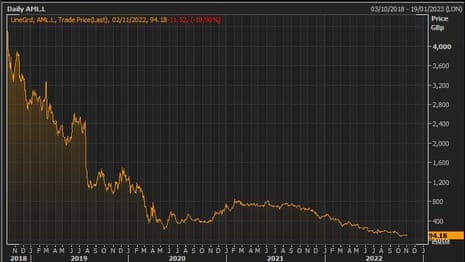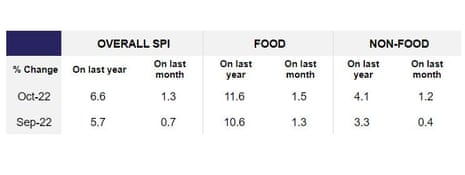Key events
Filters BETA
The boss of Maersk has also warned that Europe is close to entering a recession and the US economy may not be far behind.
After predicting that global container demand could fall 4% this year, CEO Soren Skou told Bloomberg TV:
“It’s really hard to be very optimistic with a war on our doorstep and a bigger energy crisis this winter so that is impacting consumer confidence and therefore also demand.
“It’s quite likely that we either are or will soon be in a recession, certainly in Europe but potentially also in the US.”
Shipping giant Maersk cuts its forecast for worldwide container demand, saying usage will shrink as much as 4% this year because of an economic slowdown https://t.co/VITdNL7emn
— Bloomberg (@business) November 2, 2022
Shipping giant Maersk flags slowdown in demand as dark clouds gather

Container shipping giant Maersk has sounded a warning that global demand is slowing, saying that “freight rates have peaked”.
The Copenhagen-based company told investors that the Ukraine war, Europe’s energy crisis, high inflation and a ‘looming global recession’ were all hitting the world economy.
It now expects global container demand to fall by between 2% and 4% this year, down from a previous forecast of +1 to -1%.
Although A.P. Moller – Maersk posted another record quarter for July-September, its chief executive Søren Skou warned that demand was falling:
However, it is clear that freight rates have peaked and started to normalize during the quarter, driven by both decreasing demand and easing of supply chain congestion.
The warning knocked shares in Maersk by over 5%.
The world’s biggest shipping company saw its earnings rocket as the global economy reopened after pandemic lockdowns, and demand for containers surged. Its profits tripled in 2021 to $24bn.
But now, weakening demand as soaring inflation hits spending are weighing on the sector.
CEO Skou adds that ‘dark clouds’ are gathering:
With the war in Ukraine, an energy crisis in Europe, high inflation, and a looming global recession there are plenty of dark clouds on the horizon. This weighs on consumer purchasing power which in turn impacts global transportation and logistics demand.
Shares in Next have risen 2% this morning, to the top of the FTSE 100 risers index, after it reported slightly stronger sales than expected (see 7.37am post).
But the retailer, like the rest of the sector, faces difficult times as customers will have less disposable income to spend.
Matt Britzman, equity analyst at Hargreaves Lansdown, explains:
“Broadly speaking, Next’s had a decent third quarter, though cost-of-living headwinds are still mounting for the retailer. Although the headline points to sales growth, if interest income is stripped out underlying sales saw a small decline.
A bumper week at the end of September was the standout for sales. ‘Winter is coming’ rang true as a colder week meant shoppers headed out to stock up on woollies and other warm clothes.
That’s about where the good news ends as the last two weeks of the quarter showed sales down 3.7% and 1.3% respectively and the outlook for the rest of the year points to a 2% drop over the fourth quarter, in line with previous guidance.
Adam Vettese, analyst at social investing network eToro, agrees:
Conditions are set for a disappointing Christmas period, with many households starting to feel the cost-of-living crisis begin to bite.
“Sales are forecast to dip 2% year-on-year for the rest of the year, although the firm has maintained its profit outlook.

In the City, shares in luxury carmaker Aston Martin have tumbled 10% towards a record low, after it cut its forecast for car deliveries this year.
Aston Martin blamed global supply chain problems for pushing back an expected improvement in its finances, saying deliveries of its DBX SUV vehicle had been held back by logistical disruption.
The company now expects to deliver as few as 6,200 cars, down from an earlier projection of more than 6,600 units, due to parts shortages.
Shares have dropped to 94p, the worst-performing stock on the FTSE 250.

Aston Martin’s shares have tumbled 81% during 2022.
But Lawrence Stroll, executive chairman of Aston Martin Lagonda, says the company made “excellent progress” this year towards becoming the world’s “most desirable, ultra-luxury British performance brand”.
Stroll insists Aston Martin saw “very impressive demand across our product range” and substantial revenue growth, driven by record average selling prices.
However, Stroll adds…
“On the other hand, and in the context of supply chain and logistics disruption as well as inflationary pressures impacting the broader automotive industry, over the last two quarters we have encountered specific supply chain challenges that have delayed our ability to meet customer demand.
Iceland’s Walker: households with kids most at risk from food insecurity
Richard Walker, managing director of Iceland Foods, has warned that rising food prices will get worse.
Walker tells the Today Programme that the prices of staples such as milk, bread and eggs have all jumped – which is worst for households who are struggling the most.
The supermarket boss, who has launched a bid to stand for Parliament as a Conservative MP at the next election, says further price rises are coming:
I’ve got cost prices currently on the table from big branded suppliers that we haven’t stomached yet as a business, let alone had to pass on to our customers.
So I think it will get worse.
Walker points out that that people face heating and fuel inflation, as well as rising food costs, adding:
Food insecurity is inevitably on the rise, and it’s the households with kids who are most at risk.
Walker also suggests that some essential items, such as milk and its range of £1 items, will be sold as ‘loss-leaders’ to help struggling customers.
Supermarkets have a responsibility to keep prices of staple items low, he insists:
We don’t make money on milk, and there will be loss leaders that we have to sell because our customers are simply reliant on it.
Walker is also supporting a campaign to extend free school meal eligibility so that more families qualify.
£7,400 *per household* in England is far, FAR too low a threshold to qualify for #FreeSchoolMeals – this isn’t hardship, but DESTITUTION;
Grim that 1.9m children (21% of the English pupils) are still in this bracket.
*ALL* families on #UniversalCredit should get FSM#r4today
— John McMahon (@JohnMcArts) November 2, 2022
Last month, Walker called on the government to increase Universal Credit to £20 a week.
He also told the Conservative Party conference that then-new Prime Minister’s Liz Truss’ priorities were “odd”, saying he was puzzled by tax cuts for the wealthy coupled with a lack of support for those on low incomes.
Britishvolt staves off collapse with five-week funding lifeline

Mark Sweney

Just in: Britishvolt has said it has secured a few weeks of funding and its 300 staff have agreed to take a steep pay cut.
The lifeline comes as the the UK government-backed battery startup races to find a buyer or new longer-term investor to avoid collapse.
The company, which planned to develop a £3.8bn “gigafactory” creating 3,000 jobs in the north-east of England, had been preparing to appoint administrators on Monday after the government turned down a request to bring forward £30m in previously promised grant funding.
Britishvolt, launched less than three years ago with the lofty ambition of becoming the UK’s champion in the global race to create next-generation electric batteries for carmakers, said it has secured a funding lifeline to allow it to survive at least until next month.
It declined to give details of the amount of the funding, how long it will last or the identity of any investors.
A company spokesperson said.
“We have now secured the necessary near-term investment that we believe enables us to bridge over the coming weeks to a more secure funding position for the future,”
“To further reduce our near-term costs, our dedicated employee team has also voluntarily agreed to a temporary salary reduction for the month of November.”
Britishvolt’s executive team will work unpaid for November, while directors will receive 25% pay and most of the rest of the workforce will receive 50%, the Guardian understands. The pay cuts were “purely voluntary”, a Britishvolt spokesperson said.
However, a failure to achieve the necessary payroll cuts would probably leave administration as the only option, a source with knowledge of Britishvolt’s operations said.
Here’s the full story:
And here’s an explanation of how Britishvolt’s ambition of making hundreds of thousands of batteries a year to power the switch to electric cars hit problems:
Royal Mail postal workers to strike on Black Friday
Royal Mail workers are to hold two 48-hour strikes to coincide with the busiest online shopping days in a dispute over pay, jobs and conditions.
Communication Workers Union (CWU) at Royal Mail are to strike on 24 and 25 November, and again on 30 November and 1 December, the union announced last night.
That will coincide with Black Friday (on 25th November), and shortly after Cyber Monday (on 28th November) – a particularly busy, and lucrative, time for postal operators.
The CWU, which represents more than 115,000 postal workers, has rejected Royal Mail’s “derisory 7% two-year pay offer”, saying it included “unacceptable changes”.
Royal Mail has urged workers not to strike and damage its business at the “busiest time of the year”. It says its offer is worth 9% over two years, as it includes a 2% ‘lump sum payment’.
Royal Mail says:
The CWU is playing a dangerous game with its members’ jobs and the future of Royal Mail. We urge CWU to withdraw these strikes, for the good of our customers and our people.
Last weekend, the CWU called off strikes set for earlier this month, after a challenge from the company.
CWU general secretary Dave Ward said industrial action will continue in the run up to Christmas unless the dispute is resolved.
Ward adds:
“Posties are in the fight of their lives against the Uberisation of Royal Mail and the destruction of their conditions.
“But 115,000 of our members will not just accept this war on their livelihoods and their industry.
“They will never give up the fight to protect this industry and to protect their hard-won working conditions.
Supermarkets are also scrambling to hire staff to get through the Christmas rush.
Sainsbury’s has revealed it is hiring for 18,000 seasonable jobs – 15,000 roles at its supermarkets, 2,000 at its Argos catalogue retailer and 1,000 in its logistics division.
Angie Risley, group HR director at Sainsbury’s, says:
“We know how tough it is for households right now and as well as excellent value for customers we are committed to leading colleague pay.
“Our new higher base rate, colleague discount and free food during shifts ensures colleagues will be well-rewarded for their hard work.”
Government tests energy blackout emergency plans as supply fears grow
Britons could face long energy blackouts this winter, as well as soaring prices in the shops.
The government has “war gamed” emergency plans to cope with energy blackouts lasting up to seven days in the event of a national power outage amid growing fears over security of supply this winter.
My colleagues Pippa Crerar and Alex Lawson report:
The Guardian has seen documents, marked “official sensitive”, which warn that in a “reasonable worst-case scenario” all sectors including transport, food and water supply, communications and energy could be “severely disrupted” for up to a week.
They show that ministers will prioritise getting food, water and shelter to the young and elderly people, as well as those with caring responsibilities, if the country experiences blackouts, with the Met Office warning that Britain faces a higher risk of a cold winter.
Whitehall officials are currently stress-testing Programme Yarrow, the confidential plan for coping in the event of a power outage, and have held a series of exercises with government departments and councils across the country in recent days.
Here’s the full story:

High street chain Next says its sales were slightly higher than expected over the last quarter, despite the squeeze on customers.
Next has told the City that its full price sales rose 0.4% in the 13 weeks to 29 October.
It was helped by the colder weather in early September, which encouraged customers to buy autumnwear.
Next says:
Full price sales in the last five weeks have been up +1.4%, boosted by one particularly strong week at the end of September, when temperatures dropped and sales of heavier weight products improved.
Next is sticking with its full-year guidance, having cut its profit forecasts back in September.
Next – “13 weeks to 29 October full price sales were up +0.4%2 versus last year…slightly ahead of our expectations…maintaining our guidance for full year profit before tax at £840m, up +2.1% versus last year…Earnings Per Share of 554.5p would be up +4.5% versus last year” pic.twitter.com/bHZ8nNzv5A
— Chris Bailey (@Financial_Orbit) November 2, 2022
It’s going to be a tough winter
There’s little hope that food price inflation will ease off soon, warns Andy Clarke, former chief executive of supermarket chain Asda.
Clarke, now the chairman of operational improvement specialist Newton Europe, has told Radio 4’s Today Programme that we faces a tough winter.
He says:
We’re seeing inflation numbers at over double-digit. There’s nothing we can see in the near term that suggests it’s going to go south of that. If anything, it’s going to go up.
Clarke adds that Christmas will be challenging for families, who are already facing high fuel costs and rising energy bills.
Everyone wants to enjoy Christmas, but you’ve got to take a view that certainly for the next three to six months we’re not going to see any rapid decline in inflation….
I think it’s going to be a tough winter, and food inflation is clearly adding to the burden for families.
As Bloomberg points out:
Fast fashion chain Boohoo Group Plc and high street bellwether Next Plc both issued profit warnings in September while Asos Plc is restructuring its business.
Online furniture store Made.com Group Plc is set to enter insolvency due to weaker demand and supply-chain difficulties.
Supermarkets need to offer good value this Christmas to win business from cash-strapped customers, adds Mike Watkins, Head of Retailer and Business Insight at NielsenIQ.
“External factors are keeping shop price inflation at record highs and the challenging economic conditions are significantly impacting consumer confidence and retail spend.
With pressure growing on discretionary spend across both non-food and food retail, delivering good value is the table stake in the battle for shopper loyalty over the next 8 weeks.”
Introduction: Food prices surging at fastest rate on record
Good morning, and welcome to our rolling coverage of business, the financial markets and the world economy.
UK food prices are surging at the fastest rate on record as the energy crisis, and the Ukraine war, and a shortages of workers all ratchet up the cost of living crisis.
The cost of fresh food in British shops jumped by 13.3% in October, compared to a year ago, the British Retail Consortium reports this morning. That’s the biggest annual increase since at least 2005, when the BRC started collecting the data.
Food prices overall jumped by a record 11.6%, including a 9.4% rise in store-cupboard staples such as tinned food and other less perishable foodstuffs.
Overall shop price inflation, on the BRC’s gauge, accelerated to 6.6% in October from 5.7% – again, the highest on record.

In a blow to struggling families, even essentials such as tea bags, milk and sugar became much pricier.
Helen Dickinson OBE, chief executive of the BRC, says October was a difficult month for consumers – who also saw their energy bills jump as the price cap was raised. Shops are also paying higher wages to attract and retain staff, with some supermarkets raising pay two or three times in the last year.
And there are difficult times ahead, Dickinson warns:
Prices were pushed up because of the significant input cost pressures faced by retailers due to rising commodity and energy prices and a tight labour market. Even the price of basic items went up, with the price of the humble cuppa rising, as tea bags, milk and sugar all saw significant rises.
While some supply chain costs are beginning to fall, this is more than offset by the cost of energy, meaning a difficult time ahead for retailers and households alike.
Dickinson adds that it will be hard for retailers not to hike prices again in the run-up to Christmas, and urges ministers to help the sector by freezing business rates.
Last month’s official inflation report, for September, also showed that soaring food prices were pushing up costs.
Also coming up today
MPs on the Treasury Committee are holding a session exploring the current state of the mortgage market, looking at what support is in place for vulnerable customers strugging with rising interest rates and the cost of living.
We’ll also be watching Britishvolt, the embattled UK battery start-up, which is trying to raise fresh funding from investors to avoid falling into administration.
Manufaturing data from across the eurozone, and trade data from Germany, may show whether Europe has fallen closer to recession.
Investors are bracing for the US central bank, the Federal Reserve, to agree another large rise in interest rates today. The Fed is expected to hike its benchmark rate by another three-quarters of a percent… but will it give any hint that the tightening cycle might ease soon?
The agenda
-
7am BST: German trade data for September
-
9am BST: Eurozone manufacturing PMI reports for October
-
11am BST: US weekly mortgage applications
-
12.15pm BST: ADP survey of US private sector payrolls
-
2.15pm BST: UK Treasury committee holds hearing into the UK mortgage market
-
6pm BST: US Federal Reserve’s interest rate decision


